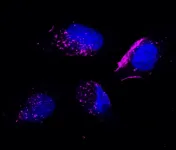Singapore, 2 September 2024 – In a new study, clinician-scientists and researchers from the National Cancer Centre Singapore (NCCS) have demonstrated the use of exosomes to successfully target squamous cell cancer tumours that are usually resistant to epidermal growth factor receptor-tyrosine kinase inhibitors (EGFR-TKIs). Their research is the first where exosomes have been applied to target TKI-resistant cancers in Singapore. The findings were published in the journal Developmental Cell last month.
Epidermal growth factor receptor, also known as EGFR, is a biomarker frequently implicated in cancer and EGFR-TKIs are a class of drugs commonly used to target EGFR and treat the disease. However, the success of these cancer therapeutics has been variable, and many tumours with high levels of EGFR are resistant to TKIs.
The discovery
One of the biggest groups of EGFR-implicated cancers are squamous cell cancers, one of the deadliest cancers worldwide. Professor Gopal Iyer, Head of the Department of Head and Neck Surgery, Division of Surgery and Surgical Oncology, Singapore General Hospital and NCCS, treats head and neck squamous cell cancers (HNSCC) in which over 80-90% of tumours have overexpressed EGFR. While treating patients in the clinic at NCCS, he observed that the majority do not respond to drugs targeting EGFR. In 2017, Prof Iyer and his research team identified mutations in a rare subset of HNSCC patients that conferred sensitivity to EGFR-TKIs. The mutation resulted in a number of changes: low expression of EGFR-AS1 and high expression of EGFR isoform D. Only 3 to 5% of HNSCC harbour these mutations leaving the rest of the patient group without an effective treatment.[1]
Using exosomes in cancer treatment
Since the initial discovery in 2017, Prof Iyer and team have worked on extending their initial findings for application to a larger group of patients. In their most recent work, they found that the EGFR isoform D produced by sensitive tumours had certain characteristics that allowed it to be secreted. Using patient-derived HSNCC cell lines in the lab, they were able to show that EGFR isoform is carried as a cargo in exosomes, and these were taken up by adjacent cancer cells and made them sensitive to TKIs.
Exosomes, which are excreted by all living cells, contains cell parts such as DNA, RNA, lipids, and proteins. They secreted into circulation and affect the function and behaviour of other cells they encounter. This communication has been shown to influence the development of various diseases including inflammatory diseases, neurodegenerative diseases and cancer, which has made using exosomes a new and promising field for medical treatments.[2]
The team then tested whether this characteristic of sensitivity conferred by high levels of the EGFR isoform D, was transferrable from a sensitive cancer to a resistant cancer. They produced large volumes of exosomes producing EGFR isoform D in the lab and treated a number of cell lines that were resistant to TKIs. The exosomal treatment was able to increase the sensitivity of the resistant cell lines to many different types of TKIs. Remarkably, they were able to achieve the same result in vivo using a mouse model, confirming that it is possible to target EGFR TKI-resistant tumours with this strategy.
Opening a treasure chest
On what this means for patients, Professor Iyer, who is also Head of the translational research Division of Medical Sciences at NCCS commented, “Our findings provide new hope for patients as we can potentially target a large population who previously had poor prognosis for their cancer. We’re excited to partner industry to move this research to the next phase so that we can start offering therapeutic solutions to our patients in the clinic.”
He also shared what the findings meant for the field of cancer research, “We have opened a treasure chest of how exosomes can potentially be applied to transfer treatment-sensitivity for other cancers. The possibilities are endless for the future of exosomes as yet another weapon in the fight against cancer!”
Next steps
The research team plans to scale up exosome production so that the findings can be taken into early-stage clinical trials. They are currently in discussions with various industry and academic partners to achieve this goal.
This research is supported by the Singapore Ministry of Health through the National Medical Research Council (NMRC) Office, MOH Holdings Pte Ltd under the NMRC Clinician Scientist-Individual Research Grant (MOH-000970) and NMRC Clinician Scientist Award (MOH-000325), and the Peter Fu Head and Neck Cancer Programme under the SingHealth Duke-NUS Oncology Academic Clinical Programme.
-END-
About the National Cancer Centre Singapore
The National Cancer Centre Singapore (NCCS) is a leading national and regional tertiary cancer centre with specialists who are experts in treating cancer. In addition to offering holistic and multidisciplinary oncology care, our clinicians and scientists collaborate with local and international partners to conduct robust, cutting-edge clinical and translational research. To achieve its vision of being a global leading cancer centre, NCCS offers world-class care and shares its depth of experience and expertise by training local and overseas medical professionals.
To meet growing healthcare needs, the new NCCS building opened in 2023 with increased capacity and expanded facilities dedicated to cancer care, rehabilitation, research and education. To give patients the best treatment outcomes, advanced and innovative treatment such as proton therapy is offered at the new Goh Cheng Liang Proton Therapy Centre at NCCS.
In 2024, NCCS celebrates its silver anniversary, celebrating 25 years of advancing cancer care from breakthroughs to healing.
About the National Medical Research council (NMRC)
The NMRC was established in 1994 to oversee research funding from the Ministry of Health and support the development and advancement of biomedical research in Singapore, particularly in the public healthcare clusters and medical schools. NMRC engages in research strategy and planning, provides funding to support competitive research grants and core research enablers, and is responsible for the development of clinician scientists through awards and fellowships. The council’s work is supported by the NMRC Office which is part of MOH Holdings Pte Ltd. Through its management of the various funding initiatives, NMRC promotes healthcare research in Singapore, for better health and economic outcomes.
[1] Tan, D. S. W., Chong, F. T., Leong, H. S., Toh, S. Y., Lau, D. P., Kwang, X. L., Zhang, X., Sundaram, G. M., Tan, G. S., Chang, M. M., Chua, B. T., Lim, W. T., Tan, E. H., Ang, M. K., Lim, T. K. H., Sampath, P., Chowbay, B., Skanderup, A. J., Dasgupta, R., & Iyer, N. G. (2017). Long noncoding RNA EGFR-AS1 mediates epidermal growth factor receptor addiction and modulates treatment response in squamous cell carcinoma. Nature Medicine, 23(10), 1167–1175. https://doi.org/10.1038/nm.4401
[2] Raghu Kalluri, Valerie S. LeBleu, The biology, function, and biomedical applications of exosomes. Science 367, eaau6977 (2020). DOI:10.1126/science.aau6977
END



